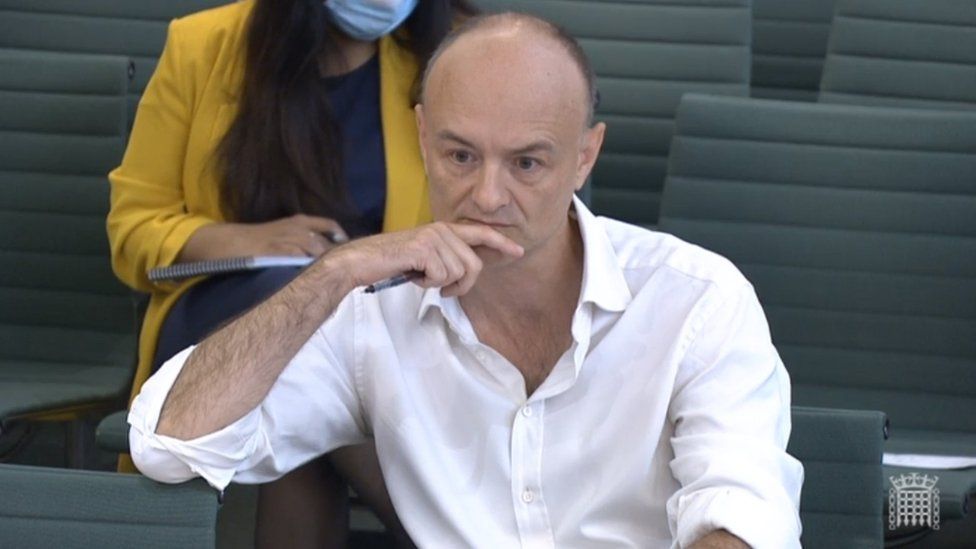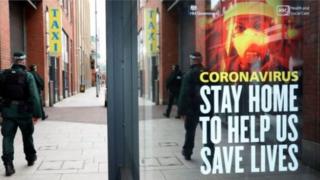
By Reality Check team
BBC News
The prime minister’s former chief special adviser, Dominic Cummings spent seven hours giving evidence to parliamentary committees about the government’s response to the pandemic.
Mr Cummings was highly critical about policies and individuals – including the Health Secretary Matt Hancock and Boris Johnson.
We’ve looked at the context around some of his claims.
“We were told categorically in March that people would be tested before they went back to care homes. We only subsequently found out that that hadn’t happened.”
Mr Cummings claimed that Matt Hancock had told him and the prime minister that people were going to be tested before they were sent back from hospitals to care homes.
He is correct that this did not happen until well into April, but we can’t verify what Mr Hancock said to Mr Cummings and Mr Johnson at the time. A spokesperson for the health secretary has rejected the claims.
On 19 March, NHS guidance said that “unless required to be in hospital, patients must not remain in an NHS bed”.
This policy was implemented to free up beds in advance of an expected surge in coronavirus patients.
On 2 April, the rules on discharging to care homes were clarified, saying “negative [coronavirus] tests are not required prior to transfers/admissions into the care home”.
It wasn’t until 15 April that the government said that all patients discharged from hospitals would be tested for coronavirus.
By this time, an estimated 25,000 patients had been discharged to care homes. In July, Panorama gathered data from 39 hospital trusts, which showed three-quarters of people discharged were untested.
There had been more than 40,000 deaths of care home residents involving Covid-19 in England and Wales up to 2 April 2021.
You can read more about the early guidance here.
“I started getting calls and number 10 were getting calls saying ‘Hancock is interfering with the building of the test and trace system because he is telling everybody what to do to maximise his chances of hitting his stupid target by the end of the month'”
Last year, the health secretary set a target of hitting 100,000 tests a day by the end of April 2020.
The government announced on 1 May that this had been reached but as we pointed out that figure included 40,000 tests that were in the post to people (who hadn’t therefore actually used them). This resulted in criticism from the official statistics watchdog.
The number of tests was below 20,000 a day for most of April, but accelerated rapidly in the last week of the month. It was about 50,000 on 29 April, 80,000 on 30 April and then over 120,000 on 1 May.
Mr Cummings also alleges that to reach the 100,000 figure, Matt Hancock was calling people asking them to “hold tests back so I can hit my target”.
Mr Hancock’s spokesperson say he rejects Mr Cummings’ claims.
“One of the critical things that was completely wrong in the whole official thinking… in February-March was: First of all, the British public will not accept a lockdown. Secondly, the British public will not accept what was thought of as an east Asian-style track and trace-type system”
Mr Cummings was responding to a question about his previous criticism of advice from behavioural scientists.
But minutes from a meeting of the behavioural science advisers, SPI-B on 12 March suggest they thought people would accept restrictions.
They note: “Expectations of how the Government will react will be set by media reports of public health strategies in other countries. This increases the risk of public concern if interventions that are perceived to be effective are not applied”.
According to YouGov polling, on 27 March 2020, a day after a national lockdown was imposed, 74% of the public approved of quarantining anyone who had “been in contact with a contaminated patient”.
The same poll found 67% approval in Singapore but over 80% in Malaysia. UK public support for cancelling large events was higher, ahead of European countries such as France, Italy and Germany, as well as east Asian countries such as Hong Kong and Malaysia
The proportion of people saying they were complying with lockdown rules were also high. According to University College London’s ongoing Covid Social Study, compliance with government guidelines actually peaked in January this year, when a third national lockdown was reintroduced.
However, research on the number of people following instructions to self-isolate tells a different story. A report by the Public Accounts Committee in March raised concern over a “lack of compliance” with Test and Trace self-isolation rules, quoting “estimates of the proportion of people fully complying with requirements ranging from 10% to 59%”.
“Obviously, we should have shut the borders in January [2020]”
Between January and March 2020, the UK introduced some measures to protect itself from the new virus.
Quarantine was imposed on 273 arrivals from Wuhan in China while travellers from other parts of China, Iran and Northern Italy were asked to isolate voluntarily for 14 days.
Those requirements were withdrawn on 13 March, 10 days before the first lockdown started. Mr Cummings said the advice to government had been that closing the borders would “essentially have no effect”.
A study from Imperial College later found that a third of Covid transmission had come from Spain and 29% from France (neither of which faced restrictions), with hardly any coming from China.
Mr Cummings said that after April 2020, there was “no proper border policy” because he claimed the prime minister didn’t want one.
The UK has only significantly toughened its border policy relatively recently – introducing quarantine hotels for people arriving in the UK from high-risk countries in February 2021.
“[Taiwan] immediately closed the borders, they introduced very strict quarantine systems, they did a whole bunch of things right off the bat in January”
Dominic Cummings repeatedly held Taiwan up as acting decisively early on in the pandemic.
Taiwan closed its borders to all visitors from China on 23 January 2020 – as soon as China said there was evidence of human-to-human transmission of Covid-19.
It also imposed mandatory quarantine for all Taiwanese citizens returning home. These measures are still in place.
Most of the island’s 23 million people were also wearing face masks, even before they were required to do so.
However, this month, Taiwan has seen a sudden rise in cases.
What claims do you want BBC Reality Check to investigate? Get in touch
Read more from Reality Check
Source link


